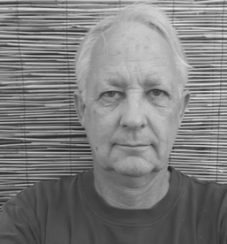So, he first switched fields to journalism, and then to electronic communications, when these tools became accessible to the public in the early 1990s. Since then, he has spent almost 30 years working with innovative new technologies and business and policy models for bringing the Internet to isolated regions and developing countries.
His activities have taken him to more than 40 countries, mostly in Africa, where he has helped establish Internet-based communications systems. This work earned him a spot as a Global Connector in the 2017 Internet Hall of Fame.

Unlike many fellow IHOF members, however, his career path has been less traditional. He didn’t study computer science or math, instead earning his bachelor’s degree in biology at Queens University, Belfast, in Northern Ireland, and then going to Canada to work on his master’s degree at the University of Guelph.
After waking up at 2 a.m. one night to the realization that his acid rain research would likely have little impact, his move to journalism was driven by the need to raise broader awareness of the problem. He began by volunteering at the local community radio station and newspaper in the small town of Guelph outside of Toronto, where he had been studying.
Although he had learned Pascal and Fortran to model energy flows in aquatic ecosystems while in Northern Ireland, Jensen said Canada was where he had been exposed to computer-based communications—BitNet and CoSy (one of the first online group messaging systems). He also wrote his own statistical analysis tools in APL and used the IBM Script system to write his thesis. When he returned to South Africa, he used a discount for journalists to get himself an early generation Epson laptop computer with an ‘acoustic coupler’ which allowed him to upload his stories to his editors while most of the other journalists were dictating them over the phone or using the telex.
Originally from South Africa, when he was 10 years old he left the country with his family due to the human rights situation at the time under the Apartheid regime. However, after his studies in Canada, he decided to return to South Africa to work as a journalist at the leading daily newspaper, the Rand Daily Mail. When the paper closed in 1985 he decided to go back to Canada because of South Africa’s deteriorating political situation.
On his way back to Canada, he picked up some home computer publications in England and noticed the listing of bulletin boards on the back page.
“That really tweaked my interest,” he said. “I realized that virtually anyone could now make information available to everyone in the world.”
Once in Toronto he was able to get a dialup account on the Usenet system through the University of Toronto, one of the first in the world to offer non-students such access.
“I was able to really learn about networking and what was going on,” Jensen said. “With free local calls in North America, I could sit indefinitely on the network.”
At the same time, he was volunteering at a local NGO, the Ontario Environment Network, while waiting for his work status to come through. And in 1986, he helped obtain a grant from the Ontario provincial government to bring the NGO’s members online. He convinced the board to purchase an IBM PC so they could host their own network. That, Jensen says, was the genesis of ‘The Web,’ a pre-World Wide Web Internet service provider he co-founded for non-profits.
The Web was one of the founding members of the Association for Progressive Communications (APC), the international NGO network established in 1990 that continues to provide Information and Communications Technology (ICT) policy advice and support for non-profits and civil society groups around the world.
When the political situation improved in South Africa in the early 1990s with the release of Nelson Mandela, Jensen returned to Johannesburg, where he had grown up, and began traveling the continent, helping organizations in Africa go online or obtain better connectivity.
He continues that work today, both in Africa and other developing countries. He currently holds a position as the APC’s Internet Access Specialist while consulting for a wide range of private and public-sector entities. His clients in the past have included the World Bank, African Development Bank, the Internet Society, the UK Department for International Development, the UN World Food Program, UNESCO, the Canadian International Development Research Center, and the Bill and Melinda Gates Foundation.
“Over the years, it’s progressed from carting rucksacks of modems across borders and helping to configure the networks, to working more on the national and regional government policy side in terms of regulations to improve access, use of universal service funds, things like that,” Jensen said. “I ended up in the national policy and strategy space because of the broader impact, but I continue to keep my hands a little dirty with the networks. These days, I have been testing wireless mesh networks to share broadband with the neighbors.”